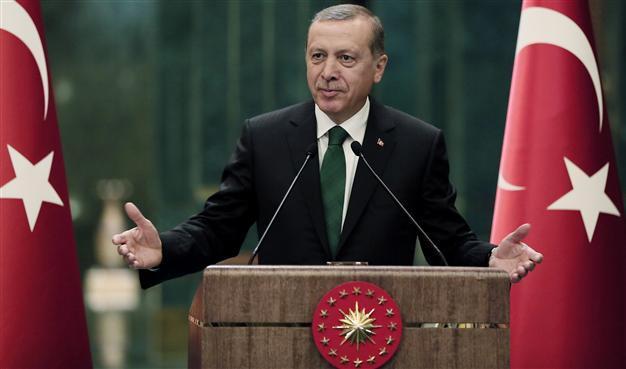Turkey needs coalition government, Erdoğan says
ISTANBUL

AA photo
Turkey needs a coalition government that can solve today's problems and build the future, President Recep Tayyip Erdoğan said. Meanwhile, the schedule for the first round of coalition negotiations has been set, with key talks starting on July 13.Erdoğan had commissioned Justice and Development Party (AKP) leader and incumbent Prime Minister Ahmet Davutoğlu to form a new government on July 9, more than a month after the June 7 general elections that the AKP lost its parliamentary majority.
Speaking at an iftar dinner organized by Istanbul University's theology faculty late July 10, Erdoğan wished success for Davutoğlu. "My wish is that a new government will be formed in line with the sensitivities of conditions for Turkey today," he said.
"Turkey needs today a coalition government that asserts its will for the solution of current problems and for building the future, instead of debating its past," Erdoğan added.
If political parties fail reach a compromise, Turkish President noted, an early election could be the solution then.
Erdoğan also defended his presidential record, claiming that "everything he has done since he was elected was in accordance with the constitution and [his] promises to the nation."
Banning coalitions
During the campaign season for the June 7 general elections, Erdoğan was accused by opposition parties of favoring the AKP, violating the constitutional impartiality of Presidency.
“Italy recently passed a law banning coalitions. While the entire world is seeking ways to boost stability, they [opposition parties] are promising a coalition government. The entire world is adopting the presidential system for stability, while they are still talking about the parliamentary system,” Erdoğan had said in his May 7 address during an inauguration ceremony in Ankara.
The main opposition Republican People’s Party (CHP) leader Kemal Kılıçdaroğlu accused Erdoğan of engaging in "delaying tactics" three days before he finally gave mandate to Davutoğlu to form a government. His critics say Erdoğan prefers a dysfunctional government to justify his ambitions to abolish parliamentarian system for a presidential one.
“Inshallah [God willing], I plan to hold the first round of talks next week, before Eid al-Fitr,” Davutoğlu told a meeting of his AKP’s parliamentary group on July 9.
The three-day Islamic holiday of Eid al-Fitr begins at the end of Ramadan, on July 17.
Calendar for talks
Previously, Davutoğlu said he would conduct coalition negotiations in two rounds. In the first round, he will listen to the leaders of other parties and designate points of conciliation.
Private broadcaster CNN Türk reported on July 11 that Davutoğlu would meet Kılıçdaroğlu at 2 p.m. on July 13. Turkish PM is scheduled to meet Nationalist Movement Party (MHP) leader Devlet Bahçeli at 2 p.m. on July 14.
The Kurdish problem-focused Peoples' Democratic Party (HDP) co-chairs would be Davutoğlu's last address. Turkish PM's meeting with Selahattin Demirtaş and Figen Yüksekdağ is slated for 11 a.m. on July 15.
Following consultations with his party, Davutoğlu is expected to hold a second round with parties with whom he believes he can cooperate.
In such a case, the framing of a possible coalition may be delayed until after Eid al-Fitr which will end on July 19.
There has been speculation that the country could return to the polls if Davutoğlu fails to form a government, although the prospect would be unprecedented.
If an early election is called, however, it would likely be held on Nov. 22, around 90 days after the provision of the mandate to form a government.
Nonetheless, the Supreme Election Board (YSK) has the legal authority to schedule the date of the election at an earlier time.
















